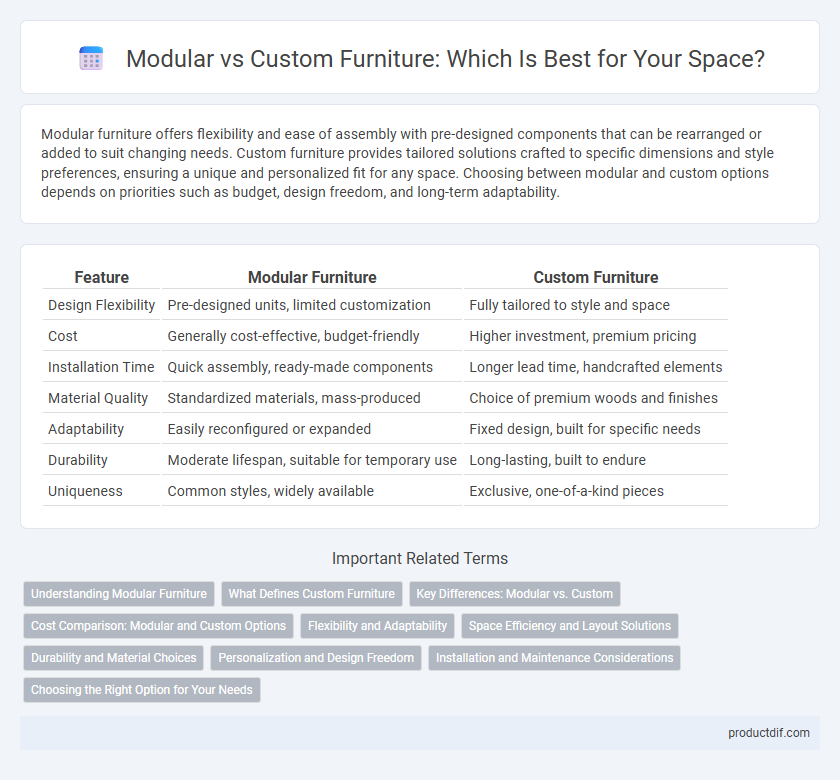Modular furniture offers flexibility and ease of assembly with pre-designed components that can be rearranged or added to suit changing needs. Custom furniture provides tailored solutions crafted to specific dimensions and style preferences, ensuring a unique and personalized fit for any space. Choosing between modular and custom options depends on priorities such as budget, design freedom, and long-term adaptability.
Table of Comparison
| Feature | Modular Furniture | Custom Furniture |
|---|---|---|
| Design Flexibility | Pre-designed units, limited customization | Fully tailored to style and space |
| Cost | Generally cost-effective, budget-friendly | Higher investment, premium pricing |
| Installation Time | Quick assembly, ready-made components | Longer lead time, handcrafted elements |
| Material Quality | Standardized materials, mass-produced | Choice of premium woods and finishes |
| Adaptability | Easily reconfigured or expanded | Fixed design, built for specific needs |
| Durability | Moderate lifespan, suitable for temporary use | Long-lasting, built to endure |
| Uniqueness | Common styles, widely available | Exclusive, one-of-a-kind pieces |
Understanding Modular Furniture
Modular furniture consists of pre-designed components that can be easily rearranged or added to create flexible and adaptable living spaces. This type of furniture optimizes space efficiency and offers cost-effective solutions compared to custom-made pieces, which require tailored manufacturing and longer lead times. Understanding modular furniture helps consumers make informed decisions by balancing versatility, budget, and design preferences.
What Defines Custom Furniture
Custom furniture is defined by its tailored design, crafted specifically to meet unique client specifications and preferences in materials, dimensions, and style. It involves a high degree of personalization, often requiring skilled artisan work to achieve precise functionality and aesthetic appeal. Unlike modular furniture, custom pieces are made to fit specific spaces and individual tastes, ensuring exclusivity and optimal use of available areas.
Key Differences: Modular vs. Custom
Modular furniture offers pre-designed, interchangeable components that simplify assembly and allow flexible reconfiguration, whereas custom furniture is tailor-made to fit specific dimensions and design preferences, ensuring uniqueness and perfect alignment with a space. Modular options often provide cost-effective, quick solutions with standardized materials, while custom pieces feature handcrafted details and premium materials for durability and exclusivity. The choice between modular and custom furniture depends on priorities such as budget, flexibility, personalization, and the desired aesthetic impact within interior design projects.
Cost Comparison: Modular and Custom Options
Modular furniture typically offers a more cost-effective solution due to mass production and standardized components, reducing overall expenses compared to custom options. Custom furniture, while higher in price, provides tailored design and material choices that enhance uniqueness but increase labor and material costs. Evaluating budget constraints alongside desired personalization helps determine the optimal investment between modular affordability and custom exclusivity.
Flexibility and Adaptability
Modular furniture offers exceptional flexibility with its easily reconfigurable components, allowing seamless adaptation to changing spaces and needs. Custom furniture provides tailored adaptability by precisely fitting unique dimensions and design preferences, ensuring optimal functionality in specific environments. Both options enhance spatial efficiency, but modular solutions excel in versatility while custom designs deliver personalized utility.
Space Efficiency and Layout Solutions
Modular furniture offers superior space efficiency by allowing users to easily reconfigure components to fit diverse room layouts and optimize available space. Custom furniture, while tailored to specific dimensions, provides unique layout solutions that maximize every inch, especially in irregular or constrained environments. Both approaches enhance spatial functionality, with modular designs prioritizing adaptability and custom options delivering precise optimization.
Durability and Material Choices
Modular furniture offers a range of durable materials like engineered wood and metal frames designed for easy assembly and reconfiguration, making it versatile but sometimes less robust than custom options. Custom furniture typically uses higher-quality hardwoods and premium upholstery selected specifically for longevity, ensuring enhanced durability tailored to individual needs and space. Material choices in custom pieces often allow for greater craftsmanship and sturdiness, resulting in furniture that withstands wear over time better than most modular alternatives.
Personalization and Design Freedom
Modular furniture offers significant design freedom with interchangeable components that allow easy reconfiguration, adapting to changing spaces and styles. Custom furniture provides unparalleled personalization by tailoring dimensions, materials, and finishes to exact preferences, ensuring a unique fit and aesthetic. Both options enhance interior design flexibility, but custom solutions deliver a higher degree of specificity for individual tastes and spatial requirements.
Installation and Maintenance Considerations
Modular furniture offers straightforward installation with pre-designed components that fit together easily, reducing setup time and labor costs. Custom furniture often requires professional installation due to unique dimensions and intricate designs, which can increase complexity and expense. Maintenance for modular pieces tends to be simpler because damaged parts can be replaced individually, while custom furniture may need specialized care to preserve craftsmanship and finishes.
Choosing the Right Option for Your Needs
Modular furniture offers flexibility and easy reconfiguration, making it ideal for dynamic spaces or frequent relocations. Custom furniture provides tailored designs that perfectly fit specific dimensions and aesthetic preferences, delivering unique functionality and style. Evaluating your space requirements, budget, and long-term usage will help determine whether modular adaptability or custom precision better suits your needs.
Modular vs Custom Infographic

 productdif.com
productdif.com